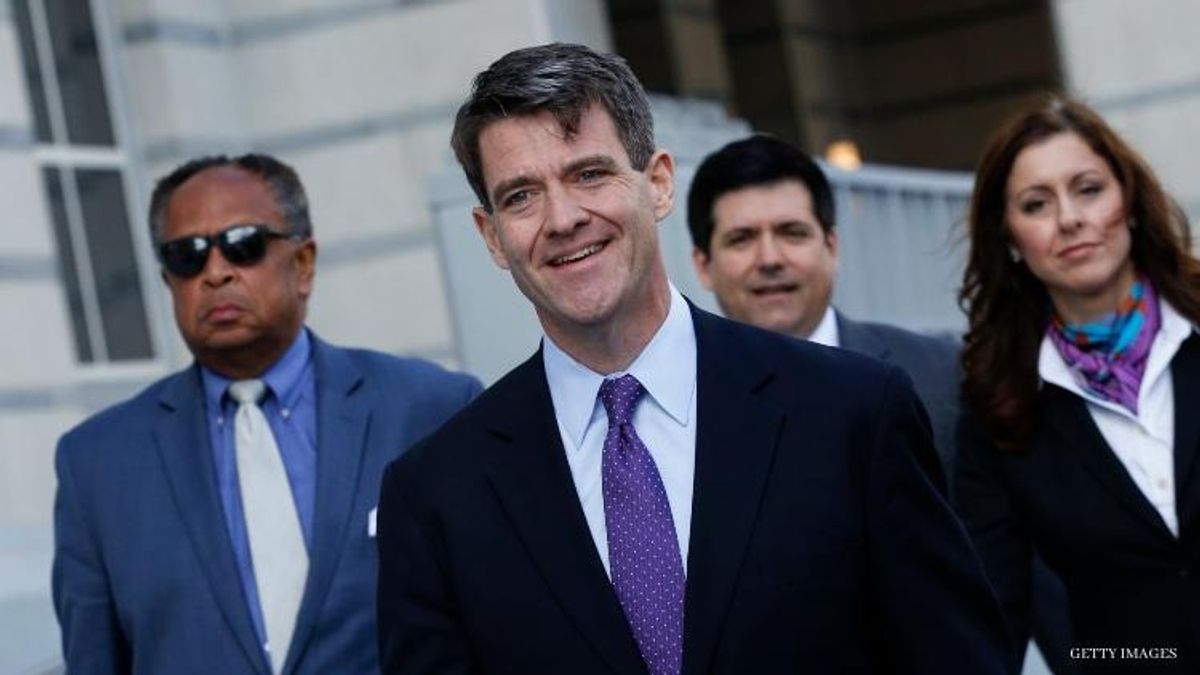In 2013 ex-New Jersey aides Bridget Kelly and Bill Baroni were charged for their connection in the closure of access lanes from Fort Lee, N.J., to the George Washington Bridge, the busiest bridge in the world with 13 lanes.
The supposed scheme, dubbed "Bridgegate," was presumed to be an act of political retaliation against Fort Lee Mayor Mark Sokolich for not endorsing then-Governor Chris Christie's reelection. It was one of the state's most highly publicized scandals, and it ultimately led to Christie's political downfall.
Now, six years later, Kelly and Bill Baroni have made their case before the Supreme Court and are awaiting the justices' decision about whether their prior convictions will stand.
Kelly, a former deputy chief of staff to Governor Chris Christie, and Baroni, the gay former executive director of the Port Authority of New York-New Jersey and ex-senator who was the only Republican to vote for marriage equality in New Jersey in 2010, were found guilty of fraud and conspiracy in November 2016.
Kelly was sentenced to 13 months in prison, while Baroni was sentenced to 18 months.
The former senator agreed to serve his time while Kelly appealed her case to the Supreme Court, who eventually agreed to hear the case Tuesday. Baroni was released from custody after serving three months when the court agreed to hear the case.
A staunch LGBTQ activist, not only did Baroni push New Jersey ahead in regards to equality but he also fought oversees to legalize same-sex marriage in Ireland, which ultimately came to pass in November 2015.
Christie was present at the court when Kelly's attorney, Jacob M. Roth, and Baroni's attorney, Michael Levy, made their case Tuesday. The ex-governor was never charged in the scandal.
The Advocate was also present as the justices were visibly skeptical about whether the former aides' actions should be considered a federal crime.
Kelly's and Baroni's attorneys challenged the basis of their prosecutions, which were centered on the wire fraud statute, 18 U.S.C. 1343. They argued that the court misapplied this statute, which states it's illegal for public officials to divert public resources for their own financial benefit. There was no such claim in the Bridgegate case.
But ultimately, the arguments weren't about whether or not Kelly or Baroni lied about creating a traffic jam. Rather, the focus was on a larger question: If a public official lies about why they do something -- even if he or she doesn't gain from it personally -- is it still considered fraud?
"Their actions in this case were fraud," Eric J. Feign, the attorney arguing the case for the Justice Department's Office of the Solicitor General, stated in court. Feign's main argument was that Baroni didn't have the authority to close down lanes.
"In just the same way it would be fraud for someone with no connection to the Port Authority to impersonate Port Authority supervisors and order Port Authority employees to realign Port Authority lanes," stated Feign.
However, Justice Samuel Alito (a New Jersey native) was quick to point out that Baroni, in fact, was authorized to make these types of changes as executive director of the Port Authority. He also noted that after reading the "jury instructions" of the original case "several times," there's "nothing in there that would alert a jury, a juror, to the obligation to find that Baroni was unauthorized."
"I've never seen a criminal case where we're asked to defer to a jury's finding on something that the jury didn't find," said Alito.
"The government is filled with rules. And there are numerous instances where a person might say something untrue about something related to a rule that gives him authority for that," Justice Stephen Breyer said.
Justice Alito used the example: "A person hires his brother-in-law for a position. Why did you hire this particular person? A qualified person for this job. The reason is [that person's] wife wants him to do it... Does that show he didn't have the authority?"
"I don't see how this case works," Breyer added.
At least six of the nine judges were skeptical overall about whether what happened was a federal crime.
Following the hearing, Baroni and Kelly had individual press conferences. The former senator did not answer questions, but said he was "grateful" the justices were paying attention to his case and will ultimately "decide whether or not I go back to prison."
Baroni stated he remains hopeful that "after six years of an investigation, an indictment, a trial, an appeal, two sentencings, and prison, Bridgegate will come to an end."
"There's another group I want to thank," he added. "And those are the guys I was in prison with. For every day I was there, they never let me stop believing, never let me give up, and sometimes people forget them. And they are not forgotten today."
On seeing Christie inside the courtroom, Kelly stated to reporters, "I'm glad he's paying attention... It's been a long six years. I hope he has a harder time seeing me than I have seeing him."
A decision is expected to be announced in late June.












































































